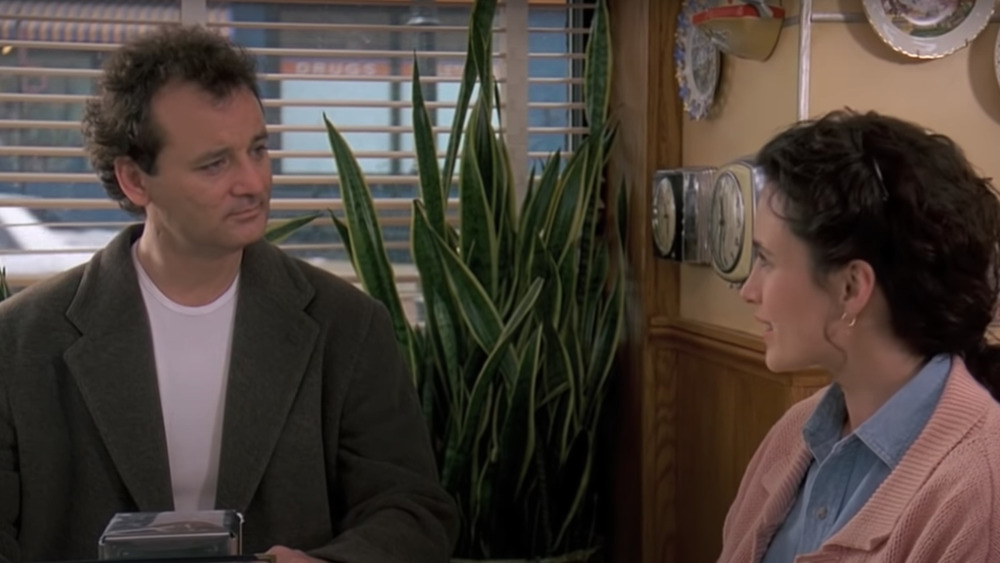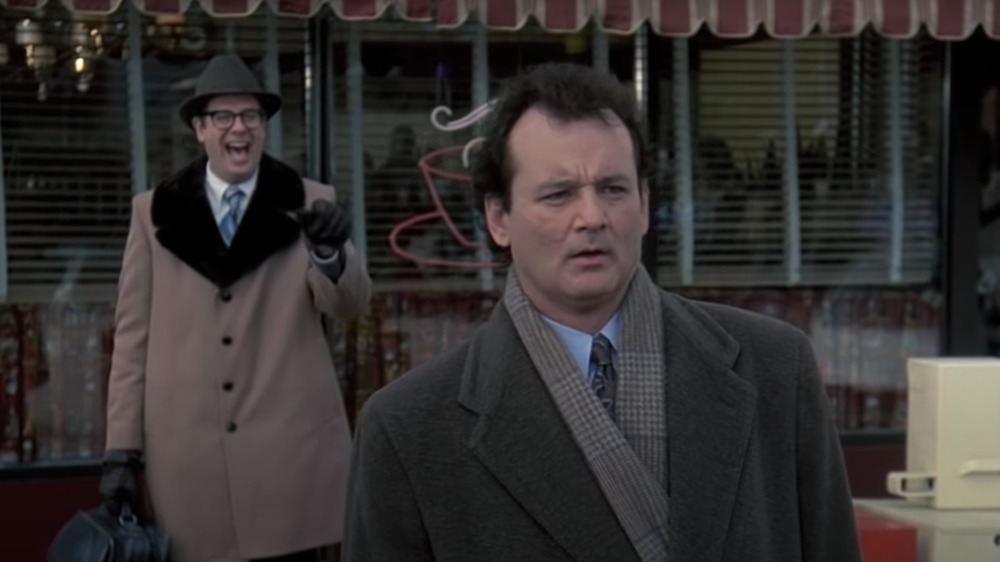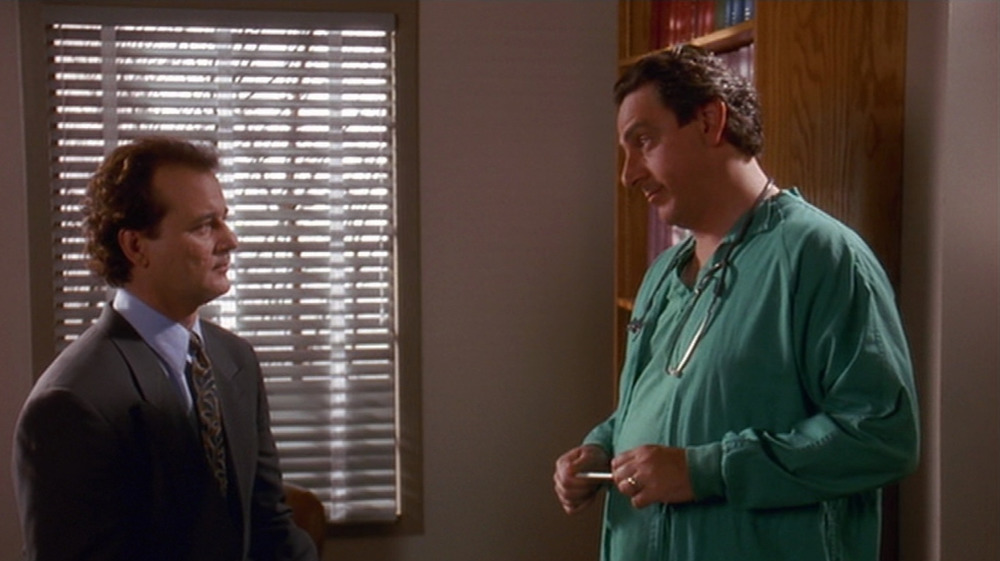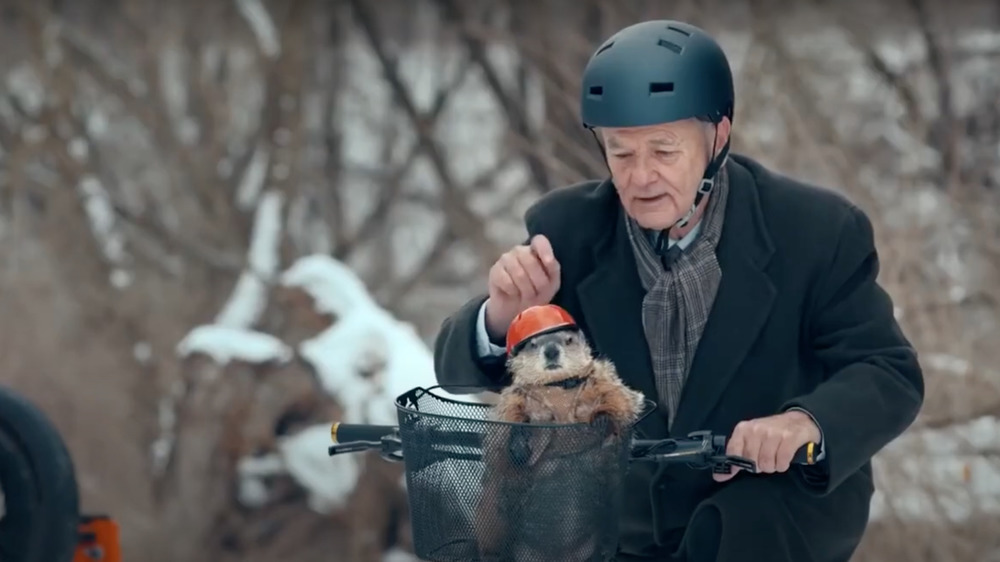Will Groundhog Day 2 Ever Happen?
We'd all like to get a do over, a chance to redo one day in our lives. In the 1993 film, Groundhog Day, sarcastic weatherman Phil Connors (Bill Murray) gets that chance, except he must repeat the day over and over and over and over. What at first seems like a dream — you can eat anything you want, do anything you want — the fantasy quickly turns into a nightmare. Phil can't even die without having the clock reset the next day to February 2, Groundhog Day.
Nearly 30 years after its release, Groundhog Day has solidified itself as a cinematic classic. Some of its stars are forever linked with the film and in 2006, the National Film Registry considered the movie to be "culturally, historically or aesthetically significant." Not only that, but religious scholars have said that the film is a perfect illustration of the Buddhist concept of samsara, the endless cycle of reincarnation and suffering that people must break to reach Nirvana (via The New York Times).
But three decades later, fans can't help but wonder if they'll ever get to see Phil come back to Punxsutawney, Pennsylvania, only to find himself trapped in another, seemingly inescapable time loop. The short answer? Probably not.
Bill Murray isn't a fan of doing sequels
Murray has appeared in so many classic films over the years that his fans would likely flock to whatever follow-up the actor decided he'd make. But, if you look at his track record, Murray is usually a one-and-done kind of actor. He wasn't interested in reviving his role for the second Caddyshack movie, was absent for the Charlie's Angels sequel, and despite finally agreeing to star in the next Ghostbusters movie, Murray felt the second film in the franchise was "unsatisfying" due to its focus on special-effects over script quality (via The Los Angeles Times).
Though Murray himself hasn't explicitly sworn off doing a sequel for Groundhog Day, his co-star, Andie MacDowell, told The Hollywood Reporter in 2018 that Murray would never be on board. "People always say 'Let's do Groundhog Day' again. First of all, Bill Murray's never going to do it so you can forget that. I know him. He's not going to do it."
Murray also famously disliked Groundhog Day, with director Harold Ramis recalling in a 2012 interview with Entertainment Weekly that the actor had "all these obvious resentments toward the production, so it was very hard for a time to communicate with him. Calls would go unreturned." Murray and Ramis also differed on what they wanted the film to be. "And they were pretty far apart on what the movie was about — Bill wanted it to be more philosophical, and Harold kept reminding him it was a comedy," Groundhog Day co-writer Danny Rubin told The New Yorker.
Harold Ramis' tragic death likely signals no Groundhog Day sequel
Groundhog Day's legacy is as much tied to Ramis as it is Murray. Ramis, who directed and co-wrote the film, was instrumental in editing multiple drafts (via Den of Geek) of Rubin's original script and tailoring the film and its main character to fit Murray's style. Ramis honed in on both the scripts' love and spirituality elements and punched up the movie to be funnier and gave it structure. "Harold built it into a three-act studio movie by giving it a very clear arc: 'This is the worst day of Phil's life. What would make it even worse? Repeating it every day,'" Rubin told The New Yorker. Ramis and Rubin went on to win a BAFTA for Best Original Screenplay in 1994.
Ramis and Murray were legendary collaborators, having worked together on classics including Caddyshack, Stripes, and Ghostbusters. But a rift between the two, both professionally and personally, put a halt to any collaborations they would ever have again. Murray's divorce was going on while Groundhog Day was being filmed and he was often at odds with the direction of the film, wanting a more philosophical approach. In Violet Ramis' memoir, Life with My Dad, Harold Ramis, the director's daughter details the rift that developed. "As has been widely documented, Groundhog Day was the film that broke the friendship between my dad and Bill Murray. Bill was going through a difficult time in his personal life, and he and my dad were not seeing eye to eye on the tone of the film. They had a few arguments on set, including one in which my dad uncharacteristically lost his temper, grabbed Bill by the collar, and shoved him up against a wall. Eventually, Bill just completely shut my dad out...for the next twenty‑plus years" (via Parade).
The two were able to make amends years later. Before Ramis died, Murray visited the ailing Ramis, bringing a box of doughnuts and conversation. "Ramis had pretty much lost his ability to speak by that point, so Murray did most of the talking" (via Vulture). Ramis tragically died in 2014 after facing complications related to autoimmune inflammatory vasculitis. With Ramis gone, it's unlikely another director could recreate the magic of the original film that Ramis helped craft.
Some Groundhog Day follow-ups already exist
Though fans will likely never get to see a Groundhog Day 2, there have been off-shoots of the film that exist in other media. Groundhog Day: Like Father Like Son is a virtual reality video game sequel in which the user plays as Phil's son, vlogger Phil Connors Jr., who, like his dad, finds himself repeating the same day over again in Punxsutawney, PA. Though Murray and the original cast do not appear in the game, the virtual reality experience still captures the feel of the original film, as Phil must connect to the individuals of the town in the hopes that it might break him out of the time loop.
In 2020, Murray reprised his role as Phil Connors for a 60-second Super Bowl Ad. Murray's Super Bowl Jeep commercial recreates the hellish time loop in which Phil finds himself: waking up at 6 a.m. to Sonny and Cher's "I Got You Babe," avoiding Ned Ryerson, and stealing the groundhog. But this time he spots a Jeep. Now Phil is giddy to repeat each day so he could continuously drive his new Jeep as much as he wants. It might only last 60 seconds and be pure product placement, but it's better than nothing.



